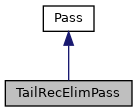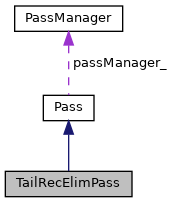#include <passes/tail_rec_elim.h>
Inheritance diagram for TailRecElimPass:

Collaboration diagram for TailRecElimPass:

Public Member Functions | |
| TailRecElimPass (PassManager *passManager) | |
| Initialises the pass. | |
| bool | Run (Prog &prog) override |
| Runs the pass. | |
| const char * | GetPassName () const override |
| Returns the name of the pass. | |
 Public Member Functions inherited from Pass Public Member Functions inherited from Pass | |
| Pass (PassManager *passManager) | |
| virtual | ~Pass () |
| template<typename T > | |
| T * | getAnalysis () |
| Returns an available analysis. | |
Static Public Attributes | |
| static const char * | kPassID = "tail-rec-elim" |
| Pass identifier. | |
Additional Inherited Members | |
 Protected Member Functions inherited from Pass Protected Member Functions inherited from Pass | |
| const PassConfig & | GetConfig () const |
| Returns a reference to the configuration. | |
| const Target * | GetTarget () const |
| Returns a reference to the target. | |
 Protected Attributes inherited from Pass Protected Attributes inherited from Pass | |
| PassManager * | passManager_ |
| Pass manager scheduling this pass. | |
Detailed Description
Tail recursion-to-iteration pass.
Turns tail-recursive methods into iterative loops, enabling our optimiser and LLVM to further improve them. The lowering of loops in OCaml is not particularly effective, but its optimiser and code generator handle tail recursion well. The opposite is true of LLVM and LLIR, which are based on SSA: most optimisation passes target loops and prologue/epilogue insertion is not optimal on tail-recursive methods. In addition, transforming tail recursion into a loop aids register allocation, since arguments are no longer fixed to specific registers at the point of the backwards jump.
The documentation for this class was generated from the following files:
- passes/tail_rec_elim.h
- passes/tail_rec_elim.cpp
 1.8.17
1.8.17